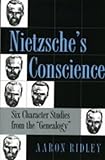Nietzsche's Conscience : Six Character Studies from the "Genealogy" / Aaron Ridley.
Material type: TextPublisher: Ithaca, NY : Cornell University Press, [2018]Copyright date: ©1998Description: 1 online resource (176 p.)Content type:
TextPublisher: Ithaca, NY : Cornell University Press, [2018]Copyright date: ©1998Description: 1 online resource (176 p.)Content type: - 9781501729676
- 170 23
- B3313.Z73 R53 1998eb
- online - DeGruyter
| Item type | Current library | Call number | URL | Status | Notes | Barcode | |
|---|---|---|---|---|---|---|---|
 eBook
eBook
|
Biblioteca "Angelicum" Pont. Univ. S.Tommaso d'Aquino Nuvola online | online - DeGruyter (Browse shelf(Opens below)) | Online access | Not for loan (Accesso limitato) | Accesso per gli utenti autorizzati / Access for authorized users | (dgr)9781501729676 |
Frontmatter -- Contents -- Preface -- Note on Sources -- Introduction -- Chapter One. The Slave -- Chapter Two. The Priest -- Chapter Three. The Philosopher -- Chapter Four. The Artist -- Chapter Five. The Scientist -- Chapter Six. The Noble -- Conclusion -- Index
restricted access online access with authorization star
http://purl.org/coar/access_right/c_16ec
Aaron Ridley explores Nietzsche's mature ethical thought as expressed in his masterpiece On the Genealogy of Morals. Taking seriously the use that Nietzsche makes of human types, Ridley arranges his book thematically around the six characters who loom largest in that work—the slave, the priest, the philosopher, the artist, the scientist, and the noble. By elucidating what the Genealogy says about these figures, he achieves a persuasive new assessment of Nietzsche's ethics. Ridley's intellectually supple interpretation reveals Nietzsche's ethical position to be deeper and more interesting than is often supposed: the relation, for instance, between Nietzsche's ideal of the noble and the ascetic or priestly conscience does not emerge as a stark opposition but as a rich interplay between the tensions inherent in each. Equally, he shows that certain under-appreciated confusions in Nietzsche's thought reveal much about the positive aspects of the philosopher's moral vision. The only book devoted entirely to the Genealogy, Nietzsche's Conscience offers a sympathetic but tough-minded critical reading of the philosopher's most important work. Delivered in clear and vigorous language and employing a broadly analytical approach, Ridley's commentary makes Nietzsche's reflections on morality more accessible than they have been hitherto.
Mode of access: Internet via World Wide Web.
In English.
Description based on online resource; title from PDF title page (publisher's Web site, viewed 26. Apr 2024)


